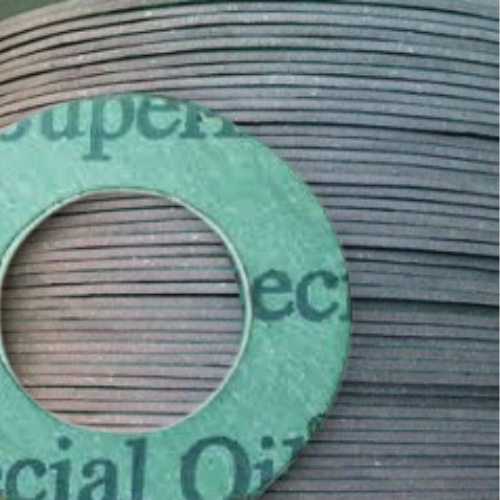Asbestos Gaskets: A Comprehensive Guide
Asbestos gaskets have long been a staple in industrial applications, valued for their durability, heat resistance, and effectiveness in sealing. While their use has significantly declined due to health concerns, they remain a relevant topic in industries where they were historically utilized. This article explores the properties, applications, risks, and modern alternatives to asbestos gaskets, providing a well-rounded understanding of their role in the world of sealing solutions.
What Are Asbestos Gaskets?
Asbestos gaskets are mechanical seals made by combining asbestos fibers with various binders, such as rubber or resins. The result is a highly durable gasket capable of withstanding extreme heat, pressure, and chemical exposure. These gaskets were widely used in industries requiring reliable sealing under harsh conditions.
However, asbestos-containing products have been largely phased out due to the health hazards associated with inhaling asbestos fibers. Today, non-asbestos gaskets have become the preferred alternative in most applications.
Properties of Asbestos Gaskets
1. Heat Resistance
o Capable of withstanding temperatures up to 500°C or higher, making them ideal for high-temperature applications.
2. Pressure Handling
o Effective in environments with high pressure, ensuring leak-proof performance.
3. Chemical Resistance
o Resistant to a wide range of chemicals, including acids, alkalis, and solvents.
4. Durability
o Long-lasting and capable of maintaining their integrity under harsh conditions.
Applications of Asbestos Gaskets
1. Industrial Sealing
• Used in pipelines, flanges, and joints to prevent leaks in industries like oil and gas.
2. Power Plants
• Effective in sealing boiler systems and turbines due to their heat resistance.
3. Automotive Industry
• Previously used in exhaust systems, engine components, and transmissions.
4. Chemical Processing
• Provided reliable sealing in environments exposed to corrosive chemicals.
Risks Associated with Asbestos Gaskets
Despite their remarkable properties, asbestos gaskets pose significant health risks due to the release of asbestos fibers.
1. Health Hazards
• Inhalation of asbestos fibers can lead to severe respiratory diseases, including asbestosis, lung cancer, and mesothelioma.
2. Environmental Concerns
• Improper disposal of asbestos-containing materials can lead to environmental contamination.
3. Regulatory Bans
• Many countries have banned or strictly regulated the use of asbestos due to these risks.
As a result, industries have transitioned to safer alternatives, such as non-asbestos gaskets.
Modern Alternatives to Asbestos Gaskets
To address health and environmental concerns, the industry now relies on non-asbestos gaskets made from materials that offer similar performance without the associated risks.
1. Non-Asbestos Fiber (NAF) Gaskets
• Made from synthetic fibers combined with rubber, these gaskets provide excellent heat and chemical resistance.
2. Graphite Gaskets
• Offer high-temperature resistance and are widely used in demanding applications.
3. PTFE (Polytetrafluoroethylene) Gaskets
• Non-reactive and suitable for chemical processing industries.
4. Metallic and Semi-Metallic Gaskets
• Ideal for high-pressure and high-temperature environments.
Key Considerations When Replacing Asbestos Gaskets
When transitioning from asbestos to non-asbestos gaskets, several factors must be considered:
1. Application Requirements
o Assess the temperature, pressure, and chemical exposure in the intended application.
2. Material Compatibility
o Choose a gasket material that is compatible with the fluids and gases in your system.
3. Regulatory Compliance
o Ensure the selected gasket meets industry standards and local regulations.
4. Performance Testing
o Conduct thorough testing to verify the gasket’s performance under real-world conditions.
The Role of Rubber Seals and Gaskets
At Rubber Seals and Gaskets, we prioritize safety and quality by offering non-asbestos gasket solutions that match or exceed the performance of traditional asbestos gaskets. Our products are designed to meet the demands of modern industries while adhering to strict environmental and health standards.
Why Choose Us?
- High-Quality Materials: Our gaskets are made from advanced materials like NAF, PTFE, and graphite.
- Custom Solutions: We provide tailor-made gaskets to meet your specific application needs.
- Expert Guidance: Our team of experts helps you select the best gasket for your requirements.
Conclusion
Asbestos gaskets were once the gold standard in sealing solutions due to their exceptional heat and chemical resistance. However, the associated health risks have necessitated a shift toward safer alternatives. Today, non-asbestos gaskets offer the same reliability and durability without compromising safety.
At Rubber Seals and Gaskets, we are committed to delivering cutting-edge gasket solutions that prioritize both performance and safety. Explore our range of non-asbestos gaskets and discover a reliable, hazard-free sealing solution for your applications.

FAQs
While asbestos gaskets are banned or heavily regulated in most countries, they may still be found in older equipment. Modern industries prefer non-asbestos alternatives.
Non-asbestos fiber, graphite, PTFE, and metallic gaskets are widely used alternatives.
Engage certified professionals to handle and dispose of asbestos gaskets according to regulatory guidelines.
Yes, non-asbestos gaskets provide comparable performance in terms of heat, pressure, and chemical resistance.
Choose safety without compromising performance—contact Rubber Seals and Gaskets for your non-asbestos gasket needs today!
